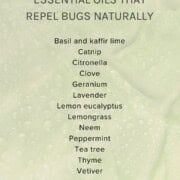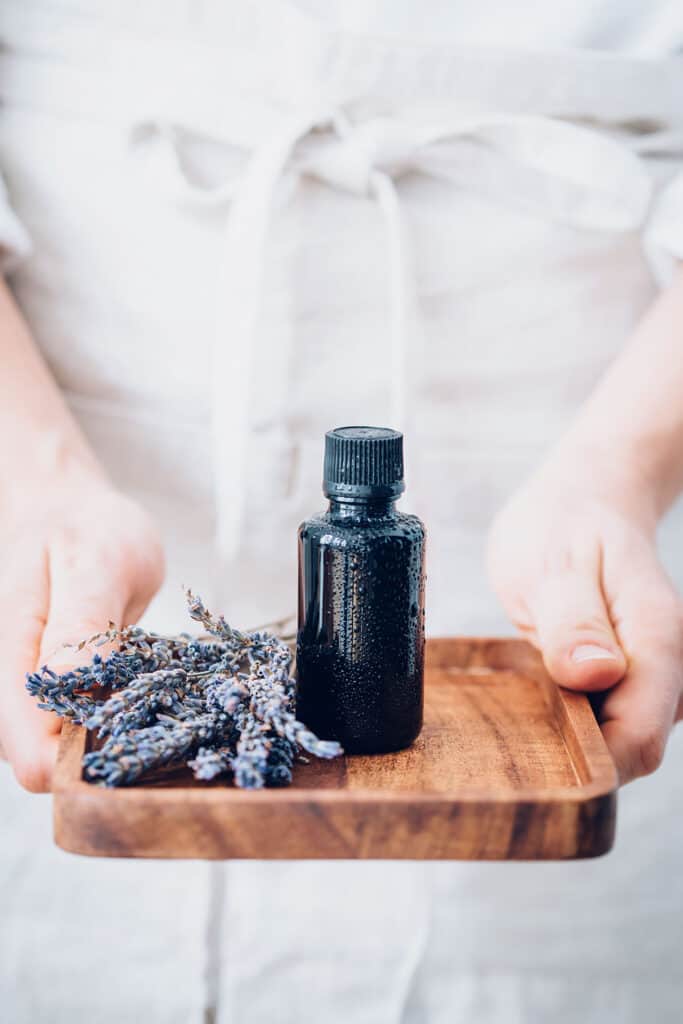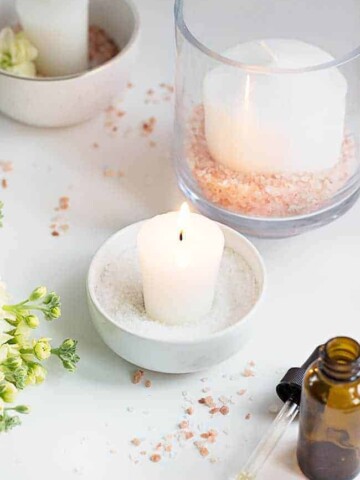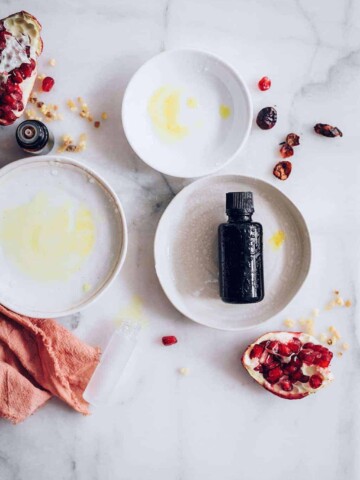I think summer is by far the best season of the year. With warm weather, sunshine, backyard barbecues, and beach vacations, what’s not to love? To me, nothing—except maybe the bugs. Thanks to the heat and humidity, mosquitoes, gnats, and those dreaded horseflies that come out in droves. Most of us resort to coating ourselves in chemical-laden bug sprays just to get rid of them. But this summer, I’m determined to get protection naturally—with bug-repelling plants and essential oils.
Essential Oils That Repel Bugs Naturally
Here are 13 essential oils that can help keep the bugs at bay so you can enjoy your time in the great outdoors.
Essential oils distilled from members of the Lamiaceae (the mint family that includes most culinary herbs), Poaceae (aromatic grasses), and Pinaceae (pine and cedar family) are commonly used as insect repellents throughout the globe [source and table].
Many commercial repellents contain a number of plant essential oils either for fragrance or as repellents, including peppermint, lemongrass, geraniol, pine oil, pennyroyal, cedar oil, thyme oil, and patchouli. The most effective of these include thyme and clove oils, alone or in combinations of clove and thyme or clove and geranium. In an older study looking at the length of action of these essential oils, they were found to repel mosquitoes for up to 2-½ hours, depending on the combination and concentration used [source].
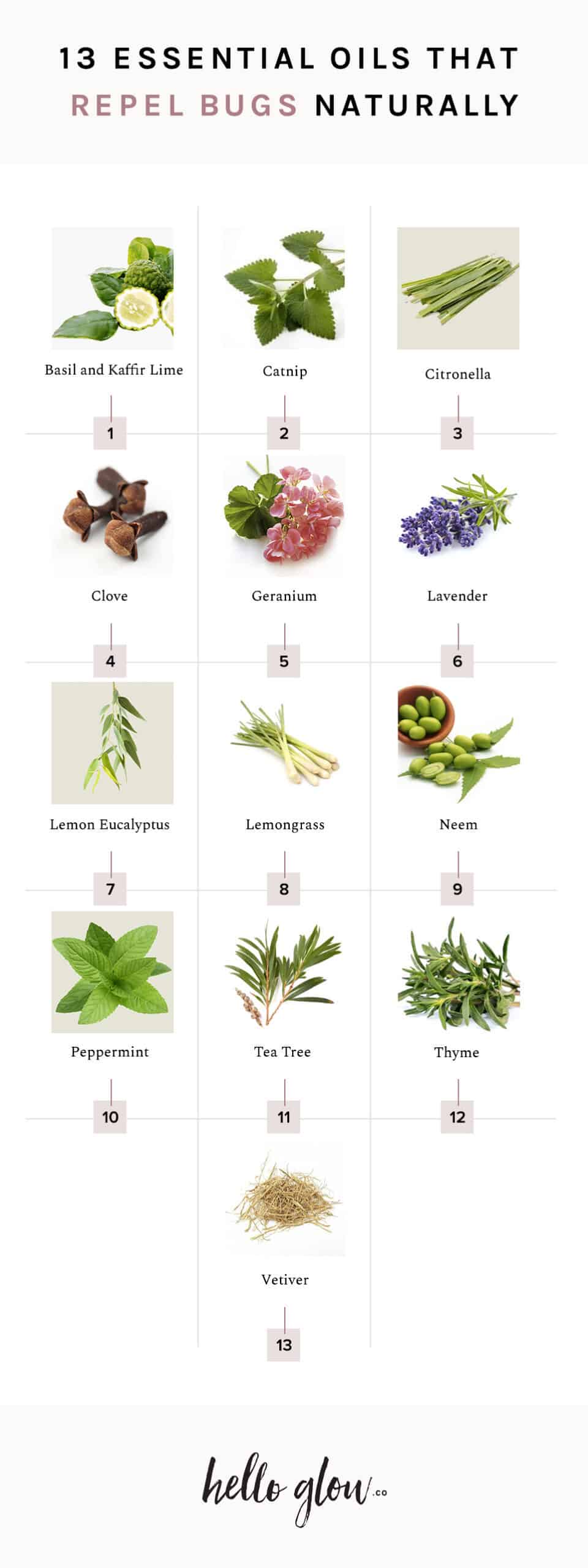
1. Basil and Kaffir Lime
In a 2001 study from Thailand (where the bugs can be downright dreadful), mosquitoes in cage conditions were repelled by turmeric, citronella grass, and hairy basil oils. This effect was extended by the addition of 5% vanillin (an extract of the vanilla bean) for up to 8 hours. And kaffir lime oil by itself worked for up to 3 hours [source].
Basil was shown to be one of the most effective of 10 EOs tested against the yellow fever mosquito (that also carries Zika, dengue, and chikungunya) in a 2022 study from Thailand. The researchers showed that it provided protection for 180 minutes using the arm-in-cage (yikes!) method [source].
A study published in 2014 looking at dust mite control with different formulations of basil oil showed that spray formulations of this oil worked pretty well, achieving 97–100% effectiveness in getting rid of those pesky bugs known for causing allergy symptoms in the home [source].
2. Catnip
The herb we refer to as catnip, Nepeta cataria, comes from a common plant that frequently grows as a weed in many parts of the United States. One study found that catnip essential oil kept mosquitoes away as well as or better than DEET. The authors concluded that a combination of both would have definite advantages in many settings [source].
Another 2014 study demonstrated that the essential oil had very high mosquito repellency for periods of at least 2 hours [source].
3. Citronella
An oil obtained from the leaves and stems of lemongrass, citronella has been registered as a plant-based insect repellent in the U.S. since 1948. Whereas most essential oils repel insects with their scent, citronella works by masking other scents that are attractive to bugs, making it difficult for them to locate their targets.
There’s no mistaking citronella’s smell since it’s commonly used in bug repellant formulas. According to The Illustrated Encyclopedia of Essential Oils, it is considered to be effective at deterring mosquitoes, fleas, and more.
When first applied topically or sprayed, citronella, which contains citronellal, citronellol, geraniol, citral, α-pinene, and limonene, was shown decades ago to be as effective dose-for-dose as DEET [source]. But the oils rapidly evaporate, causing a loss of efficacy and leaving the user unprotected. However, a more recent literature review on the effectiveness of quite a few different repellants on the market, including citronella, revealed that the addition of that trusty vanillin to both plant-based and DEET repellents increased the protection time by about 2 hours [source].
Citronella candles are readily available in most stores, especially in the spring and summer seasons, and are a popular option for those who wish to spend time outdoors without the nuisance of pesky insects. For an even more effective approach, try citronella in diffusers, which was shown in one study to have brought the repellency rate up to 68% indoors (from 14% for the candles) [source].
4. Clove
A study from 2013 looked at using the volunteer’s forearm to demonstrate that clove oil combined with coconut oil protected for 76–96 minutes, better than both citronella and lemongrass oils [source]. Some reports have raised concerns that methyl eugenol, one of the trace components of clove oil, could be a carcinogen. It is generally regarded as safe by the U.S. Food and Drug Administration, but the U.S. National Library of Medicine reported some side effects, including skin irritation and headache [source].
Looking again at how well these oils work, a group in Thailand tested 38 essential oils on a volunteer’s forearm, and it was noted that clove oil delivered 2–4 hours of repellency against all three species of mosquito. This was the longest duration of all the oils tested [source]. But again, it was most effective when applied to the skin undiluted, which for clove and many other oils can cause skin irritation.
5. Geranium
Geraniol, the active ingredient in geranium oil, has been proven effective in repelling a wide variety of insects, including mosquitoes, flies, cockroaches, ants, fleas, gnats, and ticks. When its effectiveness was studied in the form of a candle or a diffuser, the latter won out by far for both indoor and outdoor use [source]. It even beat citronella. Mix a few drops into your diffuser water, and place it in areas where bugs tend to hang out.
You might even plant a few of these bug-repelling plants around the patio. Look for citrosa geraniums, which have a strong lemony scent that bugs dislike.
You can also use the essential oil to make your own topical bug repellant. Simply mix 8–10 drops of geranium essential oil with a tablespoon of carrier oil, and apply it to exposed areas of the skin, avoiding the eyes, mouth, and nose. Try a small test section first to make sure you will not develop any skin irritation before applying it to larger areas.
With its deep, rose-like aroma, geranium is also wonderful for irritated skin. So, even if you forget to use bug repellent to keep insects at bay, consider using geranium to help soothe those nasty bug bites after they happen!
6. Lavender
An oil that’s not just limited to calming nerves and promoting restful sleep, lavender oil can be used in drawers to repel moths, sprayed from an atomizer, or left in a saucer to help keep away ants and insects.
Lavender is also effective at preventing bug bites, including those from the season’s most troublesome mosquitoes [source]. It can make a wonderful addition to DIY bug repellent recipes. Not only will you be able to utilize all of its natural benefits, but it will smell amazing as well!
Diffuse lavender essential oil to keep bugs away from your home, or wear it directly on the skin to keep flying insects away. It is another one that does double-duty when dealing with insect issues—it deters certain pests and can also help relieve itching and irritation associated with bug bites.
7. Lemon Eucalyptus
Lemon eucalyptus is composed of 85% citronellal. The oil of lemon eucalyptus—actually a different product than the essential oil—contains another powerful repellent ingredient, p-menthane-3,8-diol (PMD), a highly effective and long-acting mosquito repellent, similar to DEET [source]. And PMD exhibited better protection than DEET against the ticks that carry Lyme disease and Rocky Mountain spotted fever by keeping them from attaching and feasting [source].
Widely considered to be safe, PMD is the only plant-based repellent approved by the Centers for Disease Control for public use [source]. However, it has been shown to cause eye irritation and should not be used in children under age 3.
8. Lemongrass
Lemongrass oil is known for its citrusy scent and has been used for stomach issues, rheumatoid arthritis, and many other conditions due to its antioxidant and anti-inflammatory effects [source]. Applied topically, a 1% dilution in a spray and 15% in a cream were comparable to that of a commercial mosquito repellent [source].
This oil has been found to be safe for human and animal use, as seen in a 2015 study from Thailand, where it was shown to have excellent repellent activity against the mosquitoes that carry yellow fever, Zika, and West Nile viruses [source].
9. Neem
Neem oil has long been used as a natural pesticide for plants, but most people don’t realize that it can double as a non-toxic bug repellent for people, too. While pretty much all parts of the neem tree are used medicinally, the essential oil is extracted from the fruit and seeds of the tree, according to The Complete Book of Essential Oils and Aromatherapy.
Neem derivatives neutralize nearly 500 pests worldwide, including insects, mites, ticks, and nematodes [source]. As a natural insecticide and pesticide, it can protect against mosquitoes and various other biting insects when combined with a carrier oil and applied to the skin.
In a study from India, where the neem tree is native, the repellent action of neem oil was evaluated against different mosquito species. The 2% neem oil mixed in coconut oil provided 96–100% protection from Anopheles, the species that carries the most dangerous type of malaria. The volunteers received protection from bites for 12 hours. The researchers concluded that neem oil is safe as a topical application and can be used as a personal protection measure against mosquito bites [source].
Later studies have not found the same effectiveness or duration of action [source], however, and it is still controversial as to whether neem provides sufficient protection when used alone.
The Environmental Protection Agency (EPA) has not approved neem for use as a topical insect repellent [source]. Neem seeds should not be eaten as they carry a poison that can be dangerous in large doses. The oil is produced from the seeds, so it has the potential to be toxic if consumed.
It has a low toxicity level when applied topically, but it can cause skin irritation, such as dermatitis, when used undiluted [source]. Aromatherapy author Valerie Ann Worwood says neem should be avoided for those who are pregnant or breastfeeding or who have sensitive skin.
10. Peppermint
Peppermint essential oil, with its strong scent and tingly sensation, is great for repelling lots of different types of bugs. An active ingredient in peppermint (p-Menthane-3, 8-diol] has been registered with the EPA as a mosquito repellent since 2000 [source].
Peppermint EO applied topically was shown to provide 100% protection for 150 minutes against the yellow fever mosquito in a 2011 study [source]. Used undiluted, it showed 300 minutes of protection against the southern house mosquito in an investigation done in 2022 [source]. But keep in mind that lower concentrations (5–10%) are far less effective [source].
For flying insects, you can make a peppermint bug spray by combining 4–5 drops of peppermint essential oil with ¼ cup water in a spray bottle. Give it a good shake and spritz it on exposed skin before spending time outdoors. For the creepy-crawly bug variety, put a few drops on a cotton ball and place it in areas where you find spiders, ants, and ticks.
Remember that, due to its high menthol content, peppermint EO should not be used on or around the faces of infants or young children.
11. Tea Tree
We all know that tea tree oil is a natural antibiotic and a green cleaning powerhouse, but it is also capable of suppressing the growth of parasites, such as fleas, leeches, lice, and ticks. Diffuse it around the house or dilute it in a carrier oil and apply directly to the skin to keep the critters away.
When tested against the housefly in a 2021 study, both tea tree and lemongrass EOs were shown to have lethal action [source].
It’s also a stellar option to consider when dealing with the aftermath of bug bites. It’s commonly used in DIY bug bite soother recipes (usually combined with lavender) due to its ability to relieve and soothe itchy, irritated skin. And as a bonus—because of its effective but gentle properties—it can be used around most individuals.
12. Thyme
Thyme contains five insect-fighting substances called monoterpenes (carvacrol, p-cymene, linalool, alpha-terpinene, and thymol). When applied to the skin, they all help deter mosquitoes. In one study, all of them were effective, and a couple even showed a greater capacity than DEET in fighting the common house mosquito [source].
Thyme is a highly effective insecticide against houseflies, too.
Use 1 part essential oil mixed with 10 parts witch hazel to make a natural, homemade insect repellent spray.
13. Vetiver
When diffused into the air, vetiver essential oil acts as a natural mosquito deterrent in the house [source]. It is also known to have many cosmetic uses [source], and as an added bonus, it can be used to promote a calm, relaxed environment.
It’s also excellent for anchoring essential oil blends due to its deep, grounding aroma. So, if you’re looking for an EO to balance out your DIY bug repellent blend, consider adding vetiver to the mix. I promise you won’t be disappointed!
Although it can be used around most individuals, keep in mind that vetiver can have sedative-like effects, and only a little is needed to finish off a blend.
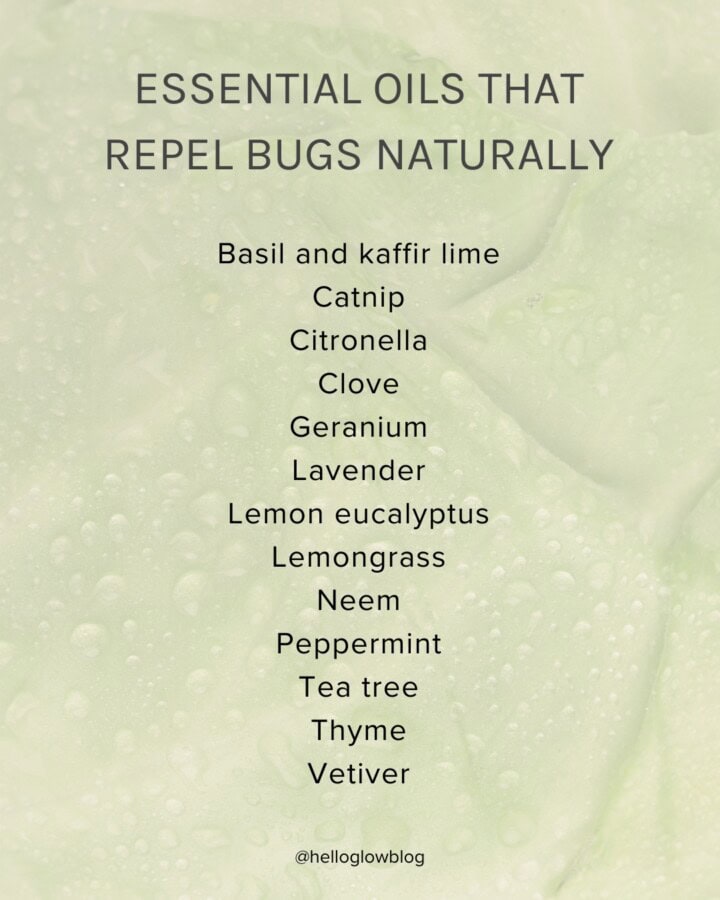
If you don't want to diffuse these oils say, because you have pets or small children, you can also use them to scent clay bracelets or necklaces and keep mosquitos and their cousins off your body. Some oils, such as citronella, are famously used in bug-repelling candles, or can be used in bug repelling sprays directly on the body or on the patio.
Do you use essential oils to keep the bugs away? If so, which oils are your favorites to use?
References:
1. Maia MF, et al. Plant-based insect repellents: a review of their efficacy, development and testing. Malar J. 2011.
2. Maia MF, et al. Table 1: An overview of repellent plant efficacy from literature review. Malar J. 2011.
3. Barnard DR. Repellency of essential oils to mosquitoes (Diptera: Culicidae). J Med Entomol. 1999.
4. Tawatsin A, et al. Repellency of volatile oils from plants against three mosquito vectors. J Vector Ecol. 2001.
5. Sutthanont N, et al. Effectiveness of herbal essential oils as single and combined repellents against Aedes aegypti, Anopheles dirus and Culex quinquefasciatus. Insects. 2022.
6. Perumalsamy H, et al. Toxicity of basil oil constituents and related compounds and the efficacy of spray formulations to Dermatophagoides farinae (Acari: Pyroglyphidae). J Med Entomol. 2014.
7. Peterson CJ, et al. Catnip essential oil and its nepetalactone isomers as repellents for mosquitoes. In: Recent Developments in Invertebrate Repellents. 2011:(Ch) 4.
8. Gkinis G, et al. Evaluation of the repellent effects of Nepeta parnassica extract, essential oil, and its major nepetalactone metabolite against mosquitoes. Parasit Res. 2014.
9. Curtis CF, et al. The relative efficacy of repellents against mosquito vectors of disease. Med Vet Entomol. 1987.
10. Lupi E, et al. The efficacy of repellents against Aedes, Anopheles, Culex and Ixodes spp. - a literature review. Travel Med Infect Dis. 2013.
11. Muller GC, et al. Efficacy of the botanical repellents geraniol, linalool, and citronella against mosquitoes. J Vector Ecol. 2009.
12. Sritabutra D, et al. Repellent activity of herbal essential oils against Aedes aegypti (Linn.) and Culex quinquefasciatus (Say.). Asian Pac J Trop Dis. 2013.
13. Lee MY. Essential oils as repellents against arthropods. Biomed Res Int. 2018.
14. Trongtokit Y, et al. Comparative repellency of 38 essential oils against mosquito bites. Phytother Res. 2005.
15. Choi WS, et al. Repellent activities of essential oils and monoterpenes against Culex pipiens pallens. J Am Mosq Control Assoc. 2002.
16. Diaz JH. Chemical and plant-based insect repellents: efficacy, safety, and toxicity. Wilderness Environ Med. 2016.
17. Shah G, et al. Scientific basis for the therapeutic use of Cymbopogon citratus, stapf (Lemon grass). J Adv Pharm Technol Res. 2011.
18. Oyedele AO, et al. Formulation of an effective mosquito-repellent topical product from lemongrass oil. Phytomedicine. 2002.
19. Soonwera M, et al. Efficacy of Thai herbal essential oils as green repellent against mosquito vectors. Acta Trop. 2015.
20. Geetha RV, et al. Essential oil repellents - a short review. Int J Drug Dev & Res. 2014.
21. Sharma VP, et al. Mosquito repellent action of need (Azadirachta indica) oil. J Am Mosq Control Assoc. 1993.
22. Abiy E, et al. Repellent efficacy of DEET, MyggA, neem (Azedirachta indica) oil and chinaberry (Melia azedarach) oil against Anopheles arabiensis, the principal malaria vector in Ethiopia. Malar J. 2015.
23. Reutemann P, et al. Neem oil: an herbal therapy for alopecia causes dermatitis. Dermatitis. 2008.
24. Kumar S, et al. Bioefficacy of Mentha piperita essential oil against dengue fever mosquito Aedes aegypti L. Asian Pac J Trop Biomed. 2011.
25. Chintalchere JM, et al. Bioefficacy of lemongrass and tea tree essential oils against house fly, Musca domestica. Proc Natl Acad Sci India Sect B Biol Sci. 2021.
26. Park BS, et al. Monoterpenes from thyme (Thymus vulgaris) as potential mosquito repellents. J Am Mosq Control Assoc. 2005.
27. Aarthi N, et al. Larvicidal and repellent activity of Vetiveria zizanioides L, Ocimum basilicum Linn and the microbial pesticide spinosad against malarial vector, Anopheles stephensi Liston (Insecta: Diptera: Culicidae). J Biopestic. 2010.
28. Burger P, et al. Vetiver essential oil in cosmetics: what is new? Medicines (Basel). 2017.
This article was medically reviewed by Dr. Gina Jansheski, a licensed, board-certified pediatrician with more than 20 years of practice experience. Learn more about Hello Glow's medical reviewers here. As always, this is not personal medical advice, and we recommend that you talk with your doctor.
979
